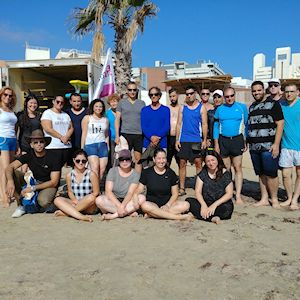Four months after the surgery that saved his life, Tomas Herdevall, who has managed the Pacific Rowing Club in Haifa for the past 20 years, set out to thank the medical team that treated him in his own way—with Kayak rowing lessons.
 The Department of Cardiac Surgery with
Tomas Herdevall (center back row, blue shirt).
Photography: Netanel Ayzik,
Spokesperson's Office, RHCC
The Department of Cardiac Surgery with
Tomas Herdevall (center back row, blue shirt).
Photography: Netanel Ayzik,
Spokesperson's Office, RHCC
For decades, Tomas Herdevall, 68, has been active in water sports and lived a healthy lifestyle. Then a random health exam revealed a dangerous blockage in the arteries leading to his heart. He underwent an emergency surgery to save his live and was forced to cope with unexpected consequences impacting his health. On July 16, 2017, Herdevall invited the Rambam medical team that saved his life to the Haifa Rowing Club, to present them with the life of one of their patients after surgery—but in particular, to say thank you.
Four months ago, Herdevall underwent a routine stress test, during which some problems were noted on his EKG. “The doctors noted a seventy percent blockage in the main artery,” recalls Herdevall. “The situation was critical and I didn’t even feel it! The same day, I was told I was going to have surgery.” Within a very short time, Herdevall underwent a quadruple coronary bypass surgery. Following the successful surgery, Herdevall was hospitalized a few more days. “At the end of my hospitalization, I decided I was going back to normal as quickly as possible,” says Herdevall. “I built a rehabilitation program for myself based on my familiarity with my body. Slowly, slowly, I returned to myself, first with walking, then a bicycle, and within a month and a half I was back to rowing kayaks. Recently, just four months after my operation, I returned from a kayaking trip with a group from abroad. Today I have returned to 100% activity.”
Herdevall’s personal rehabilitation program also included an unusual aspect: sports activities with the staff that treated him. "I wanted to thank them in my own way, through physical activity," he explains, "taking them out of the department and the routine, and giving them an experience that is mine. But I also wanted to show them what happened with patients after the operation was over. I wanted them to see someone who has been rehabilitated, who can ask questions about the process and to be exposed to this aspect of recovery as well. This message is very important to me, and for other patients as well. With willpower, it is possible to deal with this simple operation and to maintain a normal life after it. By maintaining a healthy lifestyle, you can either avoid the problem, and if it does happen, you are better equipped to deal with it, as in my case."
Herdevall’s gift was a particularly moving gesture in the eyes of the heart surgery team. “The connection between the departmental staff and the patient is not an obvious one," says Professor Gil Bolotin, the director of the department. "Seeing our patient fully active within such a short time after the operation reflects a lot about his strength, as well as our treatment We are very excited to be here together, and his gratitude warms our hearts."
This YouTube movie is in Hebrew, but you will enjoy seeing a fully recovered Herdevall and watching the medical team from the Department of Heart Surgery enjoying their gift.
Videography and Photography: Netanel Ayzik, Spokesperson’s Office, RHCC

